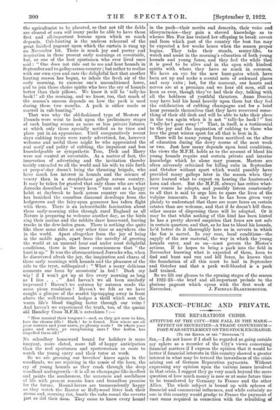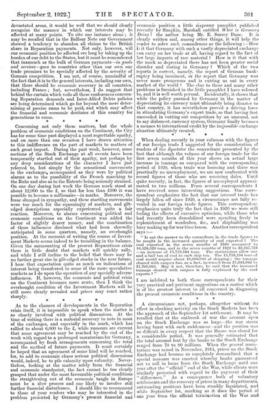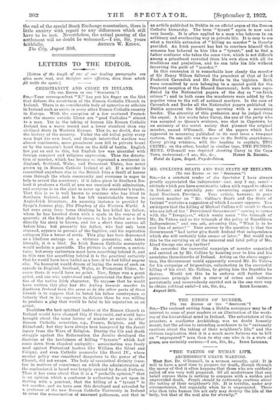FINANCE—PUBLIC AND PRIVATE.
THE REPARATIONS CRISIS. ATTITUDE OF THE CITY—THE FALL IN THE. MARK— EFFECT ON SECURITIES—A TRADE CONUNDRUM—. POST-WAR SETTLEMENT ON THE STOCK EXCHANGE.
(To TEE EDITOR OF TEE "SPECTATOR."] SIR,-I do not know if I shall be regarded as going outside my sphere as a recorder of the City's views concerning financial matters if I express the opinion that it would be better if financial interests in this country showed a greater interest in what may be termed the inwardness of the crisis arising out of German Reparation payments. Without expressing any opinion upon the various issues involved in that crisis, 1 suggest they go very much beyond the mere question of how much money is now or at some future time to be transferred by Germany to France and the other Allies. The whole subject is bound up with spheres of financial and commercial influences, and while certainly no one in this country would grudge to France the payment of vast sums required in connexion with the rebuilding of devastated areas, it would be well that we should clearly recognize the manner in which our interests may be affected at many points. To cite one instance alone ; it may be recalled that in the Balfour Note our Government showed a tendency to abandon all claims to the British share in Reparation payments. Not only, however, will our economic position be affected ere long by taking up the burden of our debt to the States, but it must be remembered that inasmuch as the bulk of German payments—in goods and services—goes to countries other than our own our trade promises to be specially affected by the severity of German competition. I am not, of course, unmindful of the fact that it is to the general interests, including our own, that there should be economic recovery in all countries, including France ; but, nevertheless, I do suggest that behind the curtain which veils all these conferences concern- ing Reparation demands and Inter-Allied Debts policies are being determined which go far beyond the mere deter- mining of precise sums to be paid, and which may affect the financial and economic destinies of this country for generations to come. * Concerning not only these matters, but the whole problem of economic conditions on the Continent, the City has for some time past displayed a most regrettable apathy, and on more than one occasion I have drawn attention to this indifference on the part of markets to matters of such great import. During the past week, however, some sections of the Stock Exchange at all events have been temporarily startled out of their apathy, not perhaps by any deep considerations of the character I have just referred to, but simply by the sensational movements in the exchanges, accompanied as they were by political alarms as to the possibility of the French marching to the Ruhr and also as to the Entente being seriously strained. On one day during last week the German mark stood at about 12,000 to the £, so that for less than £100 it was possible to become a millionaire—in marks. Moreover, the franc slumped in sympathy, and these startling movements were too much for the equanimity of markets, and gilt- edged descriptions especially experienced quite a fair reaction. Moreover, to alarms concerning political and economic conditions on the Continent was added the factor of slightly dearer money, and the combination of these influences disclosed what had been shrewdly anticipated in some quarters, namely, an overbought position. At the moment of writing the course of Invest- ment Markets seems indeed to be trembling in the balance. Given the surmounting of the present Reparations crisis there is little doubt that markets will quickly rally, and while I still incline to the belief that there may be no further great rise in gilt-edged stocks in the near future, I base that expectation quite as much on indications of interest being transferred to some of the more speculative markets as I do upon the operation of any specially adverse influences. If, however, the economic and political crisis on the Continent becomes more acute, then I think the overbought condition of the Investment Markets will be still more clearly revealed and prices may react rather sharply. * * * * As to the chances of developments in the Reparation crisis itself, it is impossible to speak when the matter is so closely involved with political dissensions. At the time of writing there is a material recovery to note in most of the exchanges, and especially in the mark, which has rallied to about 6,000 to the £, while rumours are current that some agreement may be reached by the end of the week with regard to a prolonged moratorium for Germany, accompanied by fresh arrangements concerning the total and the method of future payments. It must certainly be hoped that an agreement of some kind will be reached, for, to add to economic chaos serious political dissensions would, indeed, be to pile calamity upon calamity. Never- theless, looking at the matter solely from the financial and economic standpoint, the fact cannot be too clearly grasped that under the most favourable political conditions the straightening out of the economic tangle in Europe must be a slow process and one likely to involve still further financial disturbance. I should like to recommend to those of your readers who may be interested in the problem presented by Germany's present financial and economic position a little sixpenny pamphlet published recently by Simpkin, Marshall entitled What is Gertnany Doing ? the author being Mr. E. Surrey Dane. It is clearly written and, among other things, it will help the reader to solve such conundrums as the following :—How i3 it that Germany with such a vastly depreciated exchange can carry on her trade at all, having regard to the fact of her large imports of raw material ? How is it that with the mark so depreciated there has not been greater social disorder and rioting in Germany ? Which of the two reports is correct, namely, the report of German bank- ruptcy being imminent, or the report that Germany was never more prosperous and is cutting us out in every market of the world ? The clue to these and many other problems is furnished in the little pamphlet I have referred to, and it is well worth perusal. Incidentally, it shows that while the policy pursued by Germany in the matter of depreciating its currency must ultimately bring disaster to that country, it has nevertheless proved a driving force in stimulating Germany's export trade, so that having first succeeded in cutting out competitors by an unsound, not to say dishonest, currency system, Germany finally becomes a menace to international credit by the impossible exchange situation ultimately created. * * * When dealing recently in your columns with the figures of our foreign trade I suggested for the consideration of readers of the Spectator the conundrum presented by the fact that although the volume of our foreign trade for the first seven months of this year shows an actual large increase in tonnage as compared with the corresponding period of 1920, when trade was booming and there was practically no unemployment, we are now confronted with record figures of those who are receivina. doles. Until quite recently, in fact, the figures of unemployed approxi- mated to two millions. From several correspondents I have received some interesting suggestions. One corre- spondent emphasizes the fact that our internal trade has largely fallen off since 1920, a circumstance not fully re- vealed in our foreign trade figures. This correspondent emphasizes quite truly the fact that in 1920 we were still feeling the effects of excessive optimism, while those who had recently been demobilized were spending freely in replenishment of wardrobes, &c., and shipbuilding was busy making up for war time losses. Another correspondent says :- " Is not the answer to the conundrum in the trade figures to be sought in the increased quantity of coal exported ? The coal exported in the seven months of 1920 amounted to 16,528,529 tons, and in the seven months of 1922 to 32,247,723 —an increase of 15,719,194 tons. The statisticians allow one and a-half ton of coal to each ship ton. The 15,719,194 tons of coal would require about 10,000,000 of shipping ; the tonnage cleared with cargoes has, as a fact, increased from 21,643,942 to 31,702,665. May it not, therefore, bo said that the increased tonnage cleared with cargoes is fully explained by the coal exports ? "
I am indebted to both these correspondents for their very practical and pertinent suggestions on a matter which is of the greatest interest to all concerned in diagnosing the present economic conditions in the country. * * * A circumstance not, perhaps, altogether without its effect in checking activity on the Stock Markets has been the approach of the September 1st settlement. It may be recalled that at the outbreak of war the account open on the Stock Exchange was so large—the war storm having burst with such suddenness—and the position was so difficult in every respect that the House was closed for a considerable period. It was generally estimated that the total amount lent by the banks to the Stock Exchange ranged from 70 to 80 millions. When the general mora- torium was raised in November, 1914, prices on the Stock Exchange had become so completely demoralized that a special measure was enacted whereby banks guaranteed not to call in loans from the Stock Exchange until one year after the " official " end of the War, while clients were similarly protected with regard to the payment of their " differences." As a consequence both of voluntary settlements and the recovery of prices in many departments, outstanding positions have been steadily liquidated, and while September 1st, marking as it does the period of one year from the official termination of the War and the end of the special Stock Exchange moratorium, there is little anxiety with regard to any differences which still have to be met. Nevertheless, the actual passing of the settlement will no doubt be welcomed.—I am, Sir, yours




































 Previous page
Previous page